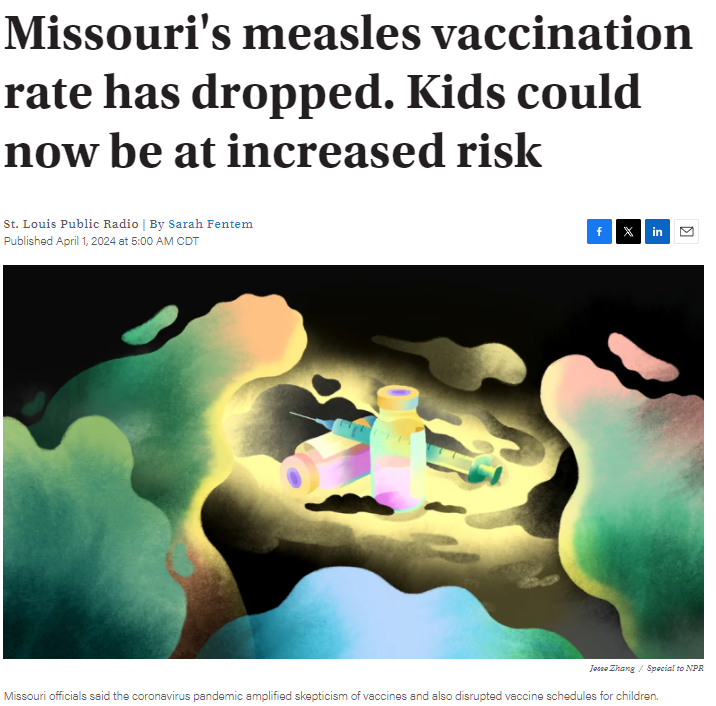 In today’s rapidly changing healthcare landscape, the role of dentists has expanded beyond traditional oral care. Recognizing their unique position within communities and their extensive knowledge of anatomy, infection control, and patient management, many states are exploring the benefits of extending Public Health Emergency (PHE) exceptions to allow dentists to administer vaccines beyond the end of the pandemic. Dentists in Missouri cannot currently provide vaccinations and Missouri has not received adequate support of proposed legislation in the recent legislative sessions to do so.
In today’s rapidly changing healthcare landscape, the role of dentists has expanded beyond traditional oral care. Recognizing their unique position within communities and their extensive knowledge of anatomy, infection control, and patient management, many states are exploring the benefits of extending Public Health Emergency (PHE) exceptions to allow dentists to administer vaccines beyond the end of the pandemic. Dentists in Missouri cannot currently provide vaccinations and Missouri has not received adequate support of proposed legislation in the recent legislative sessions to do so.
Expanding the scope of dentists to administer PHE vaccines post-pandemic in Missouri offers a multitude of benefits for the state and its residents. From increased accessibility to accelerated vaccination rates, by leveraging the professional expertise and public trust in dentists, this strategic collaboration empowers Missouri to combat vaccine-preventable diseases. Missouri, like many other states, stands to gain numerous benefits from empowering these highly skilled healthcare professionals to play a more significant role in vaccination efforts and ensure a healthier future for its citizens. This approach holds significant potential to enhance vaccine accessibility, improve public health outcomes, and strengthen the overall healthcare system in the state of Missouri.
In the 2023 Legislative Session in Missouri, two major bills that proposed to expand vaccine administration authority were unsuccessful. SB270 and HB249 proposed to expand the dental practice scope to include administering vaccines to individuals above the age of seven post public health emergency. Despite being heard by legislative committees, the bills did not ultimately pass.
According to Dwight Mcleod, DDS, and the dean of A.T. Still University’s Missouri School of Dentistry & Oral Health, many dentists are already qualified to provide injections with precision, and adding vaccines to their level of care would be a valuable contribution to improving community health. “People don’t have the best access to care, including access to medical and dental care, and if dentists can fill the gap by administering vaccines after completing the training course on vaccine storage and administration, they will be contributing to the healthcare team, thereby helping to reduce the rate of vaccine-preventable diseases, like HPV-related oropharyngeal cancer.” If mobilized, Missouri would not be the first state to pass legislation allowing dentists to administer vaccines. In Minnesota, dentists are authorized to administer vaccines, including COVID-19 vaccines, under certain circumstances. The Minnesota Board of Dentistry has issued an emergency rule allowing dentists who have completed an approved training program to administer vaccines during the COVID-19 pandemic.
In Oregon, dentists are also authorized to administer vaccines under certain circumstances. The Oregon Dental Board has issued a rule allowing dentists who have completed an approved training program to administer vaccines, including influenza vaccines, to patients aged 3 years and older. Dentists in Wisconsin are allowed to administer COVID-19 and flu vaccines after completion of training in vaccine administration, storage, and recordkeeping, among other conditions. It is important to note that expanding the scope of dentists to administer PHE vaccines should be accompanied by proper training, collaboration with other healthcare professionals, and adherence to relevant guidelines and protocols.
In sum, expanding the scope of dentists to administer PHE vaccines in Missouri offers numerous benefits. It increases the number of healthcare professionals available for vaccine administration, improves accessibility to vaccination services, and promotes a comprehensive approach to oral and overall health. Dentists, with their extensive medical training and experience in administering injections, can contribute to meeting the high demand for vaccine administration, ensuring a more efficient and timely immunization process. These advantages collectively contribute to a more equitable and effective immunization strategy for Missouri.
Prefiling of legislation for the 2024 session begins in December, and the session runs from January 3rd through May 11th, 2024. During this time, you can stay informed with current legislation activities by visiting the Missouri Senate website or the Missouri House of Representatives website.
References:
Bill tracking in Missouri – HB 249 (2023 legislative session). FastDemocracy. (2022, December 1). https://fastdemocracy.com/bill-search/mo/2023/bills/MOB00018156/
Centers for Disease Control and Prevention. (2022, October 3). HPV and oropharyngeal cancer. Centers for Disease Control and Prevention. https://www.cdc.gov/cancer/hpv/basic_info/hpv_oropharyngeal.htm
Immunizations. Immunizations | Health & Senior Services. (2016). https://health.mo.gov/living/wellness/immunizations/
Immunization information for Dentists. Oregon Health Authority: Immunization Information for Dentists: Immunization Provider Information: State of Oregon. (n.d.). https://www.oregon.gov/oha/ph/preventionwellness/vaccinesimmunization/immunizationproviderresources/pages/dentists.aspx
Legislative branch. MO.gov – Official Missouri State Website. (2023). https://www.mo.gov/government/legislative-branch/
Missouri Senate. (2023). https://www.senate.mo.gov/
Missouri House of Representatives. Missouri House of Representatives – Home. (2023). https://house.mo.gov/
Office of the revisor of statutes. Chapter 4 – MN Laws. (2021). https://www.revisor.mn.gov/laws/2021/0/4/
Roberts, S. (2023). Missouri SB270: 2023: Regular session. LegiScan. https://legiscan.com/MO/text/SB270/id/2630469




